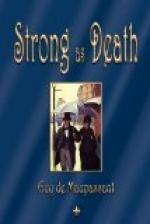The three blows were struck, and suddenly the sharp little tap of a bow on the leader’s desk stopped short all movement, all coughing and whispering; then, after a brief and profound silence, the first measure of the introduction arose, filling the house with the invisible and irresistible mystery of the music that penetrates our bodies, thrills our nerves and souls with a poetic and sensuous fever, mingling with the limpid air we breathe a wave of sound to which we listen.
Olivier took a seat at the back of the box, painfully affected, as if his heart’s wounds had been touched by those accents. But when the curtain rose he stood up again, and saw Doctor Faust, lost in sorrowful meditation, seated in his alchemist’s laboratory.
He had already heard the opera twenty times, and almost knew it by heart, and his attention soon wandered from the stage to the audience. He could see only a small part of it behind the frame of the stage which concealed their box, but the angle that was visible, extending from the orchestra to the top gallery, showed him a portion of the audience in which he recognized many faces. In the orchestra rows, the men in white cravats, sitting side by side, seemed a museum of familiar countenances, society men, artists, journalists, the whole category of those that never fail to go where everyone else goes. In the balcony and in the boxes he noted and named to himself the women he recognized. The Comtesse de Lochrist, in a proscenium box, was absolutely ravishing, while a little farther on a bride, the Marquise d’Ebelin, was already looking through her lorgnette. “That is a pretty debut,” said Bertin to himself.
The audience listened with deep attention and evident sympathy to the tenor Montrose, who was lamenting over his waning life.
Olivier thought: “What a farce! There is Faust, the mysterious and sublime Faust who sings the horrible disgust and nothingness of everything; and this crowd are asking themselves anxiously whether Montrose’s voice has not changed!” Then he listened, like the others, and behind the trivial words of the libretto, through that music which awakens profound perception in the soul, he had a sort of revelation as to how Goethe had been able to conceive the heart of Faust.
He had read the poem some time before, and thought it very beautiful without being moved by it, but now he suddenly realized its unfathomable depth, for it seemed to him that on that evening he himself had become a Faust.
Leaning lightly upon the railing of the box, Annette was listening with all her ears; and murmurs of satisfaction were beginning to be heard from the audience, for Montrose’s voice was better and richer than ever!
Bertin had closed his eyes. For a whole month, all that he had seen, all that he had felt, everything that he had encountered in life he had immediately transformed into a sort of accessory to his passion. He threw the world and himself as nourishment to this fixed idea. All that he saw that was beautiful or rare, all that he imagined that was charming, he mentally offered to his little friend; and he had no longer an idea that he did not in some way connect with his love.




